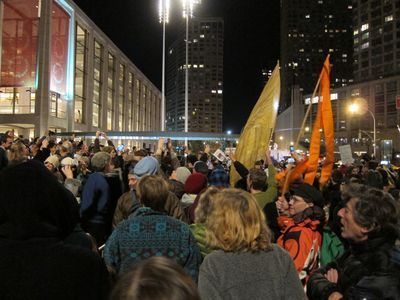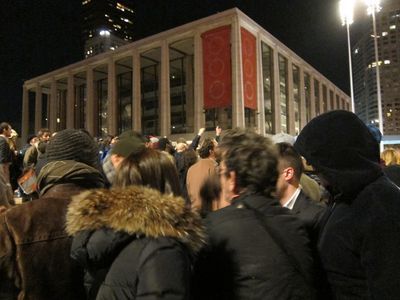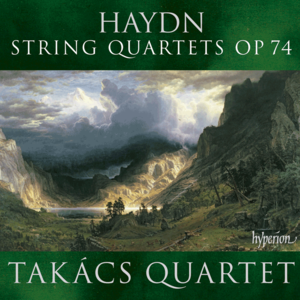Alex Ross's Blog, page 209
December 3, 2011
Best Music Writing events
A reminder that two events marking the release of Best Music Writing 2011 will take place in New York next week: on Tuesday night, a reading at powerHouse Arena in Brooklyn, and on Thursday night one at Housing Works Café. Above is a video of a song by the Iranian singer Mohsen Namjoo, on a text by Hafez; Morad Mansouri writes about it in his Best Music Writing essay, "The Underground Rises."
December 1, 2011
The Satyagraha protest (updated)
As promised, Philip Glass spoke at an Occupy Wall Street demonstration at Lincoln Center tonight, after a performance of Satyagraha at the Met. The protest, which was directed not at the opera itself but at a certain disparity between its lofty moral message and the machinery of corporate arts funding, got under way during the third act; police cleared everyone from the plaza, loitering music critics included (I had gone to the Mahler Tenth at the New York Philharmonic), and so the crowd assembled on the sidewalk at the foot of the steps. When the Satyagraha listeners emerged from the Met, police directed them to leave via side exits, but protesters began encouraging them to disregard the police, walk down the steps, and listen to Glass speak. Hesitantly at first, then in a wave, they did so. The composer proceeded to recite the closing lines of Satyagraha, which come from the Bhagavad Gita (after 3:00 in the video above): "When righteousness withers away and evil rules the land, we come into being, age after age, and take visible shape, and move, a man among men, for the protection of good, thrusting back evil and setting virtue on her seat again." In accustomed style, he said it several times, with the "human microphone" repeating after him. Lou Reed and Laurie Anderson were in attendance, and at one point Reed helped someone crawl over the barricade that had been set up along the sidewalk (see photo below). The police didn't seem to know quite how to react. In all, it was a remarkable scene.
Update: Seth Colter Walls, who fortuitously showed up in the picture above (he's partly blocked by Lou Reed's head), has an excellent commentary in The Awl. What I liked about the Lincoln Center protest is that it generally didn't take an antagonistic stance toward those attending Satyagraha — and with good reason, because the great majority of them weren't members of the "one percent." (Met tickets are expensive, yes, but no more so than Yankees tickets or Jay-Z tickets. And you can see the HD Live encore of Satyagraha on Dec. 7 for much, much less.) That said, there were some ill-informed comments afterward about opera being available only to the wealthy. Seth takes these apart, writing, "This persistent fiction of 'elitism' . . . is one of the strongest propagandistic tools ever devised by the titans of corporate pop culture." (For more on the affordable end of classical music, see my cheap seats page.) Maury D'Annato makes similar points on Parterre. By the way, Seth is amusingly right about the power of wearing a suit, "even a cheap one." My attempt to explain to the police that I was a New Yorker writer was undoubtedly undermined by the fact that I was wearing a knit Red Sox cap.
The Satyagraha protest
As promised, Philip Glass spoke to an Occupy Wall Street demonstration at Lincoln Center tonight, after a performance of Satyagraha at the Met. The protest, which was directed not at the opera itself but at a certain disparity between its lofty moral message and the machinery of corporate arts funding, got under way during the third act; police cleared everyone from the plaza, loitering music critics included (I had gone to the Mahler Tenth at the New York Philharmonic), and so the crowd assembled on the sidewalk at the foot of the steps. When the Satyagraha listeners emerged from the Met, police directed them to leave via side exits, but protesters began encouraging them to disregard the police, walk down the steps, and listen to Glass speak. Hesitantly at first, then in a wave, they did so. The composer proceeded to recite the closing lines of Satyagraha, which come from the Bhagavad-Gita (after 3:00 in the video above): "When righteousness withers away and evil rules the land, we come into being, age after age, and take visible shape, and move, a man among men, for the protection of good, thrusting back evil and setting virtue on her seat again." True to form, he said it several times, with the "human microphone" repeating after him. Lou Reed and Laurie Anderson were in attendance, and at one point Reed helped someone crawl over the barricade that had been set up along the sidewalk (see photo below). The police didn't seem to know quite how to react. In all, it was a remarkable scene.
Miscellany: Andris Nelsons's Boston future, etc.
Music of Chris DeBlasio, Kevin Oldham, and others at the annual Benson AIDS Concert for World AIDS Day.... Does Andris Nelsons have a Boston future? Now that Riccardo Chailly has withdrawn from his much-talked-about Boston Symphony dates next month, all eyes are on the brilliant young Latvian, who made a strong impression on Boston players last season and who is scheduled to lead a program in early January. It's telling that he's been given a role in the Tanglewood 75th-anniversary gala.... Good news from Other Minds: early next year they're reissuing Michael Tilson Thomas's survey of the works of Carl Ruggles, a classic two-LP set that never appeared on CD.... This weekend, the Postclassical ensemble, of Washington, DC, presents a full production of Falla's El amor brujo, with dancers from the Peridance company. Tickets are $25 — about the same as Jay-Z's Occupy Wall Street T-shirt.... Next week, the mighty JACK Quartet plays a program of Earle Brown, Peter Ablinger, Horaţiu Rădulescu, and Alex Mincek (his striking Third Quartet) at the spectacular EMPAC venue in Troy, New York. Tickets are $18 — a bit less than Jay-Z's Occupy Wall Street T-shirt.... Augustin Hadelich, one of the most characterful of younger violinists, plays in the Peoples' Symphony series this weekend. Tickets are $13 — significantly less than Jay-Z's Occupy Wall Street T-shirt, and about a fifth the price of the cheapest tickets for Jay-Z and Kanye West's show in Chicago tonight.... The excellent new group yMusic appears at Rockwood Music Hall on Sunday. Tickets are $10 — etc., etc.... Speaking of Occupy Wall Street, Philip Glass will address a protest at Lincoln Center tonight, following the final performance of Satyagraha. Glass's masterpiece will be seen again in the HD Live series on Dec. 7.
Mm-hm
"We're giving opera a bad name, in a way, by the way we present ourselves — the way we sort of say, 'Well, we know the plots aren't very good, but we've got good costumes!' Or, 'Well, we know it's old-fashioned, and it's long, but we have an exciting theater director doing it.' . . . The other thing that's driving me crazy is the notion that somehow, in the last five years, the opera community has finally discovered how to act."
— Joyce DiDonato, in a new interview with Opera News
November 30, 2011
Thought of the day
"As the troop ship glided down the sea lane, the old man still watched it from the turtle-back. That howling swarm of brown arms and hats and faces looked like nothing but a crowd of American boys going to a football game somewhere. But the scene was ageless; youths were sailing away to die for an idea, a sentiment, for the mere sound of a phrase . . . and on their departure they were making vows to a bronze image in the sea."
— Willa Cather, One of Ours
November 28, 2011
CD of the Week: the Takács' Haydn
The finale of Haydn's "Rider" Quartet, Op. 74 No. 3; Takács Quartet (Hyperion).
Audio player for iPad and iPhone:
November 27, 2011
Esa-Pekka Salonen: The Rest Is Noise Interview
The University of Louisville has announced that the winner of the 2012 Grawemeyer Award for music is Esa-Pekka Salonen. He receives the prize in recognition of his Violin Concerto, which had its premiere in April 2009, during Salonen's final weeks as music director of the Los Angeles Philharmonic. (I was present for the occasion, and wrote about it here.) Salonen is back in L.A. this week, preparing to conduct the world premiere of Orango, an operatic fragment by Shostakovich. He'll then head up the coast to lead the San Francisco Symphony in performances of his award-winning concerto, with Leila Josefowicz as soloist; after that he goes to Chicago, to introduce a new violin concerto by James Matheson. Amid this flurry of American activity, the hyper-cosmopolitan Finn found time to answer a few miscellaneous questions.
Winning the Grawemeyer puts you in the company of many of your composing heroes and cherished colleagues: Lutosławski, Ligeti, Boulez, John Adams, Thomas Adès, and Kaija Saariaho, among others. What did you feel upon receiving the news?
Beside being just generally delighted and touched, I felt extremely happy to join that list. Many of the previous recipients were massive influences and supporters in my youth, and many others are among my most admired colleagues and friends today.
You have long had one foot in the world of conducting and one foot in the world of composing. Do you still wish to adjust the equation, or do you believe that you have found the right balance?
Believe me, as long as I live I will feel that the balance needs to be adjusted somehow. I have been aiming at a 50/50 balance, and am currently conducting somewhat more than that. I will take a longer total break from conducting in the 2013-14 season to adjust the balance. The main problem of my scheduling is that any time in the diary which is not strictly conducting is called composing time. This is an illusion as the so-called "life" happens within the other 50%: family time, recovery, reading, general charging of batteries, taking cat to the vet.
There is presently a worldwide rebellion against inequalities in income. How should classical music, popularly associated with elites and wealth, react in the current climate?
All we have to fight is the prejudice, a false image created by miscommunication and sometimes by total lack of communication. In this country for instance, the cheapest tickets to orchestra concerts are not dramatically more expensive than tickets to sports events or movies. Without any student or senior reductions, the cheapest regular tickets cost little over twenty dollars mostly, in Europe often a lot less than that. By far the most expensive concert ticket I ever bought was for a Madonna show, by the way.
The sad fact is that we are witnessing a fierce anti-intellectual period in Western culture, both here and in Europe. Populist right-wing movements are attacking the arts and enlightened critical thinking everywhere, and the epithet "elitist" is being used as the favorite blunt instrument by those politicians. So far I haven't seen the anti-Wall Street/London City protest movement forming any direct cultural positions, but I cannot see how classical music with its very modest commercial dimensions would be seen as an enemy by anybody who is willing and able to look beyond the uninformed use of the word "elitist."
You are back in Los Angeles this week, conducting your old orchestra. What do you miss about the city?
I miss the openness, both mental and physical. And my friends. When I arrived here last week I was stunned to realize how huge a part of me is still here.
Have you encountered any strong new composing voices? Older works that are speaking to you anew?
I'm constantly trying to reassess and relearn everything I know, even about works I have conducted hundreds of times before. In my conducting life, the new thing is opera, which I did not do much when I was with the LA Phil. I have developed an incurable Wagner disease, and getting more and more fascinated by Janáček. I just finished a massive Bartók project with the Philharmonia, more than thirty concerts in seven countries, including ten performances of Bluebeard's Castle. I really feel that my understanding of that amazing stuff has deepened to a completely new level. However, I'm going to take a little break from it now for a few seasons.
I'm constantly trying to find young composers whose work deserves and needs support. The latest discovery was Joseph Phibbs, a young, British, Cornell-trained composer, who is beginning to make waves. Steven Stucky called and told me to take a look at his stuff. Decided to commission an orchestra piece for the Philharmonia straight away.
What books are on your nightstand or in your carry-on bag?
W. G. Sebald, always. I read a lot of history books at the moment. Realized how thin my knowledge is of the late-Roman, early-medieval period. I might be the last one who hasn't yet read Franzen's Freedom. Downloaded it onto my iPad as well as the Steve Jobs bio.
Several years ago you admitted to listening to Shakira at the gym. Are there any guilty or guilt-free pleasures on your current playlist?
I love tacky Italian pop. Most likely because of the jukebox at Bar Rolli in Magenta, an industrial suburb of Milano where I lived when studying with Castiglioni. I always had my supper there, and got to know all the emerging local pop stars very well. In gyms I listen to Paola & Chiara, Gianna Nannini, and Laura Pausini. My children find this deeply shameful.
November 26, 2011
A Caldara moment
Prompted by Les Arts Florissants' lustrous rendition of Caldara's Crucifixus a 16 on a new Virgin Classics CD.
Show of shows
 In Listen to This, I mention a few live performances that had an overpowering effect on me: Robert Shaw conducting the Mahler Eighth at Carnegie Hall, Gidon Kremer leading an eerie chamber arrangement of Shostakovich's Fifteenth Symphony at midnight in Lockenhaus, and a 1991 church-basement rock show featuring the bands Fugazi, The Ex, and Nomeansno. Many other events might have come to mind, not least Bernstein's Mahler Second at National Cathedral and any number of performances by Lorraine Hunt Lieberson, but those were the three that occurred to me as I was writing. As Ben Sisario notes in today's New York Times, Fugazi, successor to the iconic hardcore band Minor Threat, have begun putting out a huge trove of live recordings, and that show with The Ex, at Sacred Heart Church in Washington DC, is slated for future release. It was maybe the most intense rock show I ever saw — a sensual riot of disciplined ferocity on the part of musicians and audience alike. The room was swelteringly hot, and at one point I retreated to the depopulated backstage area for a spell of relief. I found myself looking out from behind Fugazi as they played, a writhing mass of flesh in front of them, pandemonium pending. I don't know whether The Ex will be included on the release — for me, they were the killer element — but it will be fun to hear the tape all the same. Or will it? In an age where almost nothing escapes recording, is it better to let the electronic evidence fall away and rely upon our imperfect, impassioned memories?
In Listen to This, I mention a few live performances that had an overpowering effect on me: Robert Shaw conducting the Mahler Eighth at Carnegie Hall, Gidon Kremer leading an eerie chamber arrangement of Shostakovich's Fifteenth Symphony at midnight in Lockenhaus, and a 1991 church-basement rock show featuring the bands Fugazi, The Ex, and Nomeansno. Many other events might have come to mind, not least Bernstein's Mahler Second at National Cathedral and any number of performances by Lorraine Hunt Lieberson, but those were the three that occurred to me as I was writing. As Ben Sisario notes in today's New York Times, Fugazi, successor to the iconic hardcore band Minor Threat, have begun putting out a huge trove of live recordings, and that show with The Ex, at Sacred Heart Church in Washington DC, is slated for future release. It was maybe the most intense rock show I ever saw — a sensual riot of disciplined ferocity on the part of musicians and audience alike. The room was swelteringly hot, and at one point I retreated to the depopulated backstage area for a spell of relief. I found myself looking out from behind Fugazi as they played, a writhing mass of flesh in front of them, pandemonium pending. I don't know whether The Ex will be included on the release — for me, they were the killer element — but it will be fun to hear the tape all the same. Or will it? In an age where almost nothing escapes recording, is it better to let the electronic evidence fall away and rely upon our imperfect, impassioned memories?
Alex Ross's Blog
- Alex Ross's profile
- 425 followers









